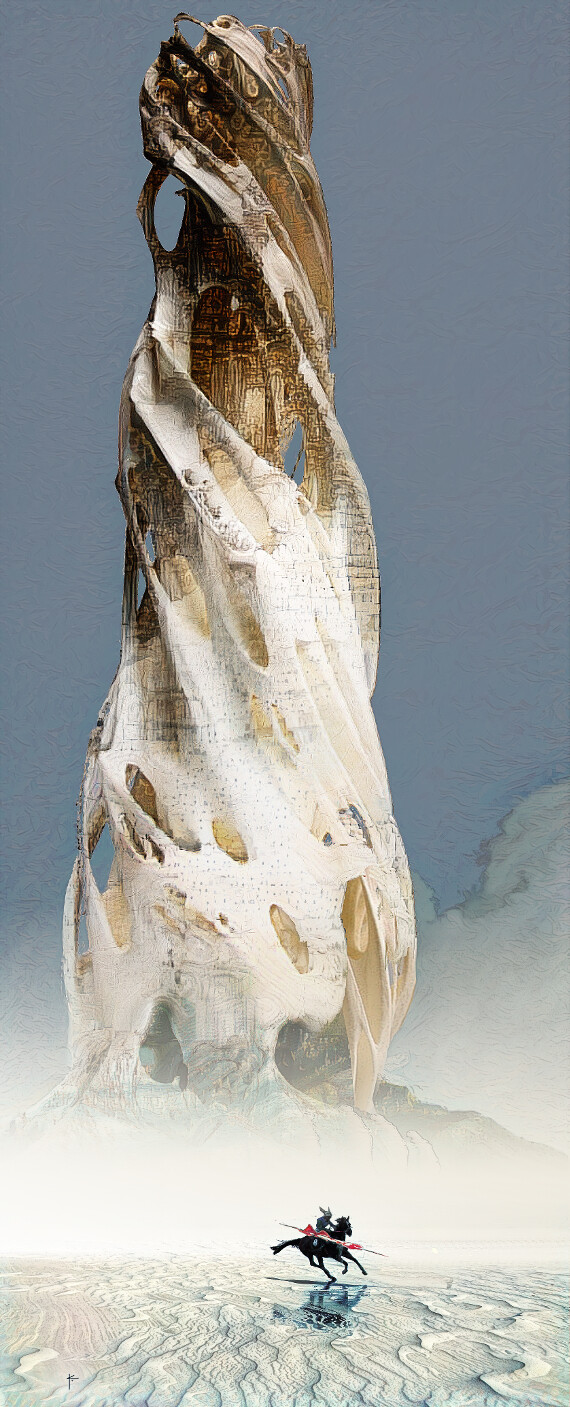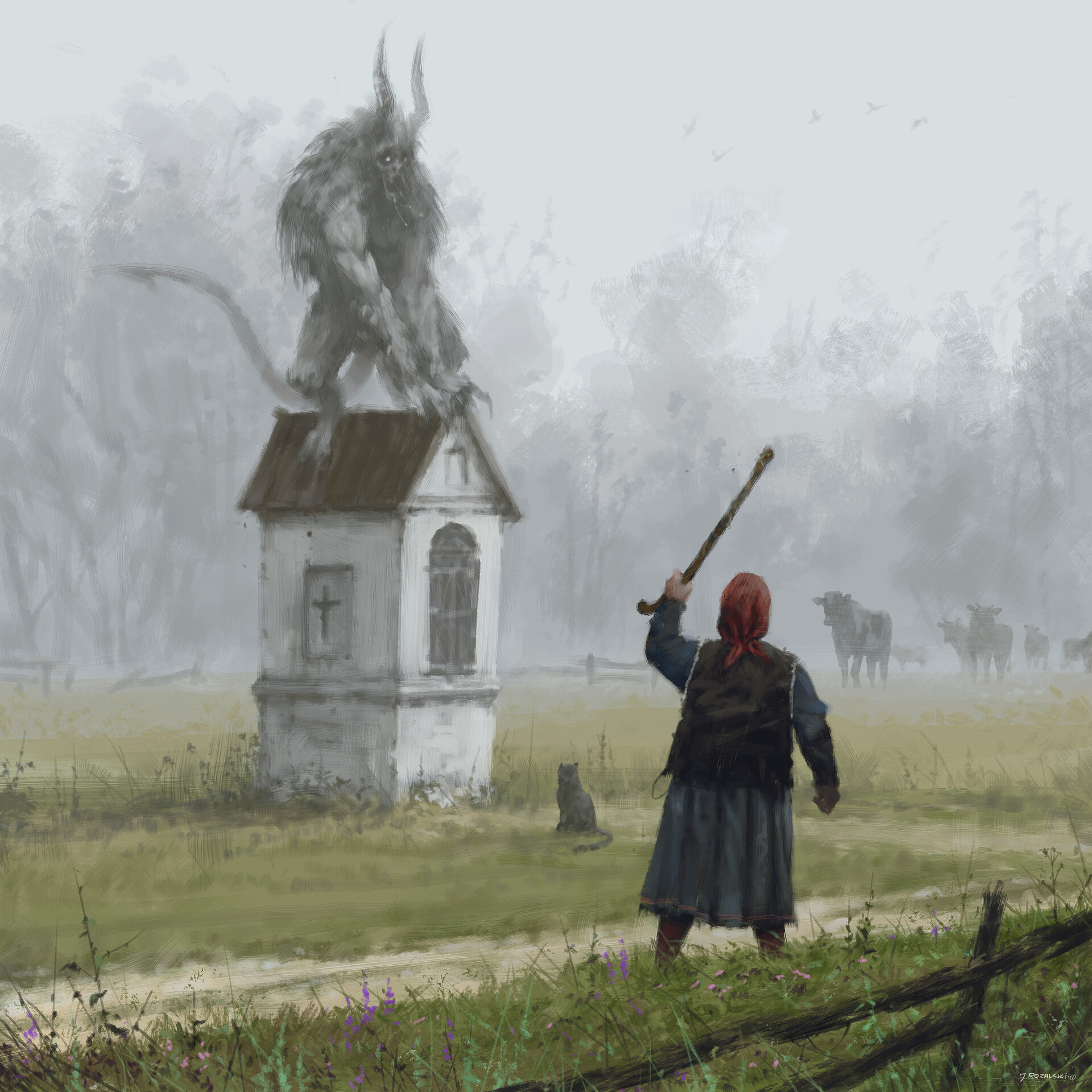The Sphinx is, along with the Angel and Medusa, my favorite fantasy creature. They are one of my principle OD&D races, featured heavily in COMMANDMENT, and are aesthetically one of my touchstones for Fantasy as a whole. So, have a blog dedicated to fleshing out the Sphinx in OD&D, 5E, and general fantasy games.
 |
| by Casimir Lee |
The Universe, and, in fact, every universe is a spell in the process of being cast. This spell is sentient. This spell wishes to understand itself, its purpose, where it is going, where it came from. Thus life is born. Stardust makes complex compounds, the universe's magic is sheaved off to form a soul, and evolution begins. Across every universe, life of all kinds abounds. The Sphinx is but one of many, but one special nonetheless.
A riddle, personified. The Sphinx was born wholecloth from the divinity that is the universe, created from eons of watching life evolve and still not finding the answer to the Question of Questions. The Sphinx knows this. It is born wise, adult, knowing of many things and many languages. But the Sphinx is young in soul, lonely amidst the stars, the cosmos. It knows why it was born, but not why all was born, and it sets to work. The work: become wiser still, through any and all means, so that one day the Question of Questions can be answered.
This makes them great adventurers. They happen upon a strange land and seek to know all there is to know. If you're looking for treasure, or weapons, or secrets, and you happen upon a man or woman or them wing'd and gold-swathed, a man or woman or them who is a master of a thousand and one riddles, you'd be a fool not to ask them to ally with you. And, of course, the Sphinx will. You are but one of many vectors towards wisdom in the future. By knowing you, watching you, fighting with you, and even killing you, the Sphinx grows more.
Not all Sphinx are so kind. Some, especially those that are older, are cruel. They seek wisdom in violence, death, suffering, annihilation. Their kin do not judge them for this. There is wisdom to be found in all things. There in lies the biggest difference between you and they. You have morality guiding you forward. The Sphinx has a quest, eternal and known, and any means needed to complete it is thus Righteous. Some are chaotic. Some are lawful. Some choose to be good. Some choose to be evil. Some choose to be both, or neither. All, though, are Righteous, and they can be convinced no different.
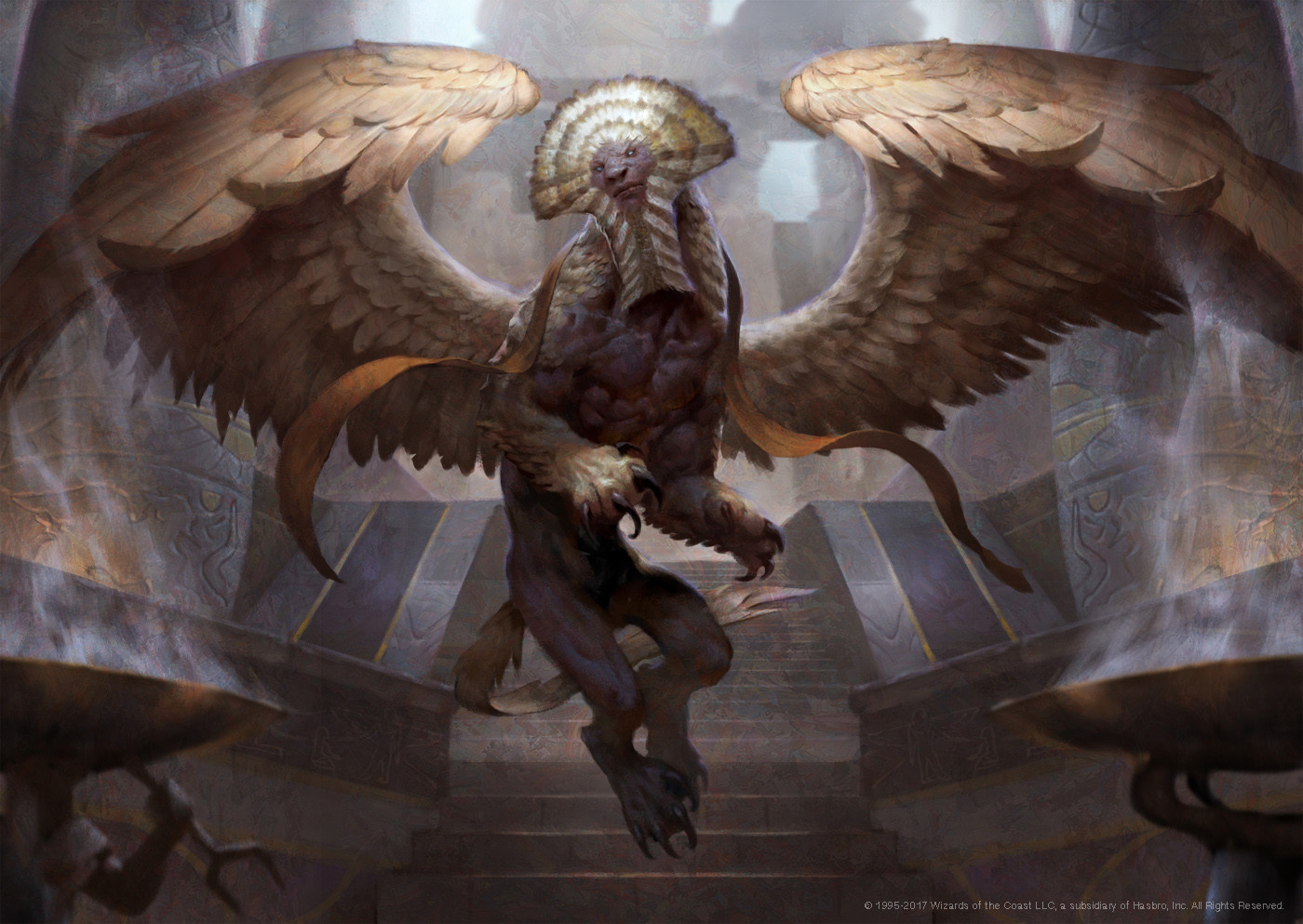 |
| Lius Lasahido |
The
form of the Sphinx is a bit different then what you're used to imagining. This is because they are creatures of two forms.
They are born as adults, in the shape of humans, for it is that shape that is most common throughout all universes for those seek answers. They are wing'd, to better traverse the world. Gold adorns them, for gold is the metal of greed, and they are greedy for wisdom in all of its forms. Their skin is of a color olive, or mahogany, or porcelain. Their eyes are hazel or green and star-flecked.
But wisdom is the domain of lions as well, who know much of the universe instinctively. Thus, the sphinx has the ability to take on this majestic, powerful form. The older they are, the larger their shape. They retain their wings, too. A Sphinx who no longer wishes to adventure will usually retain this shape, for reasons many.
Fur sapphire-rich or jet-deep. Manes wild as burning plains or regal as the king's crown. Eyes slitted, glowing in the dark, burning pieces of gold worth more than any coin. Claws and fangs sickle'd and sharp, blades enchanted by long learning years.
The Sphinx is not born, it is made. All are infertile. When a Sphinx is truly wise, it will have answered the riddle of how to create a child and will do so. Some will choose to parent, but most do not; after all, their child is an adult already, ready to fly into the world and have its own questions answered. Know that this means that it is rare that Sphinx congregate. There are no Sphinx towns or Sphinx cities. The only time they gather is in death, when their souls fly into the great beyond, ruminating at the Horizon together before going to explore some distant afterlife.
Know too that a Sphinx cannot die of old age, unless it wills away its immortality. Thus, many live for epochs, recording what they know on stone tablets or in omen and song.
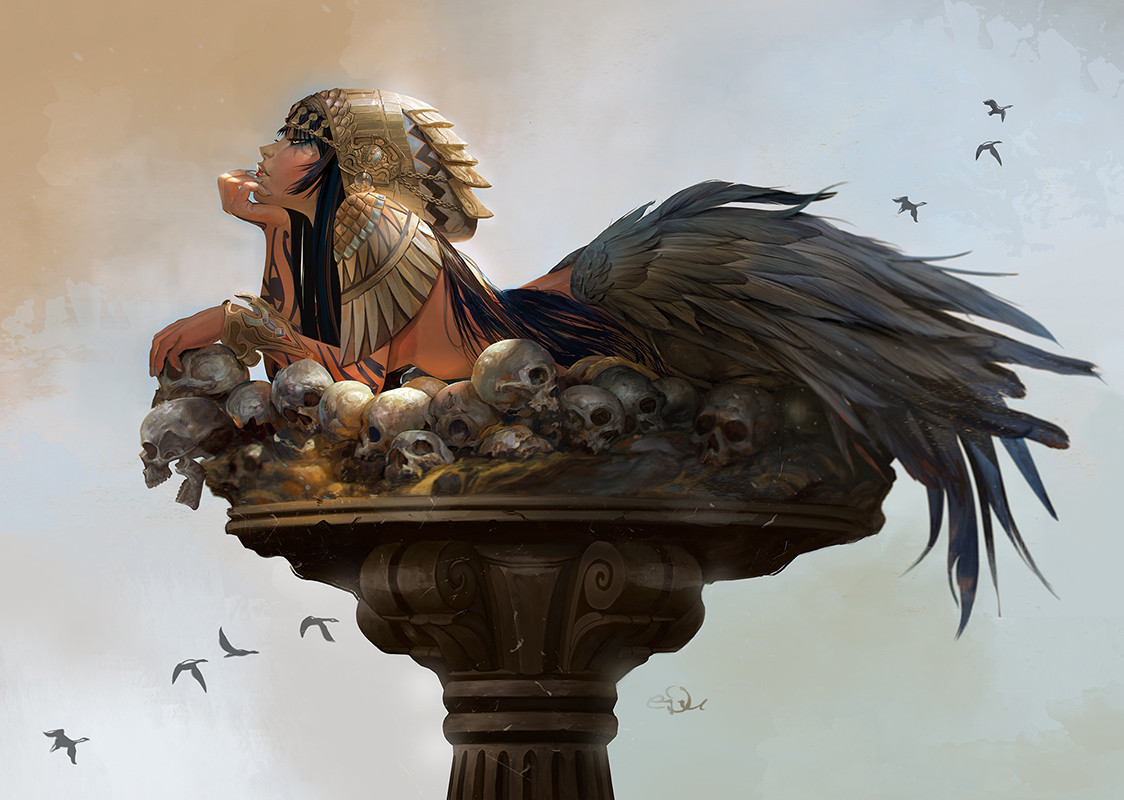 |
| Eduardo Francisco |
All Sphinx will ask riddles. They ask these riddles
not because they know the answer, but because they are trying to find an answer. However, it is common wisdom that creatures will not lend the Sphinx their minds for any suitable length of time. Most get frustrated and leave. This is why so many Sphinx will threaten death, or a curse, or offer a gift in exchange for having the riddle answered. Coercion is, of course, how wise beings barter--at least, that is what many Sphinx come to believe.
Here be a riddle generator. For every game you play a Sphinx, or run with a Sphinx in it, keep it on hand; most Sphinx greetings include a riddle of some sort. In exchange for wisdom gained, the Sphinx will likely aid whoever it is answering the riddle. This is one of the many ways Sphinx adventurers come to be.
SPHINX - OD&D
Sphinxes are magic-users, and can only progress to 8th level (Warlocks). Sphinxes can use no magical items other than scrolls and potions. Sphinxes may only arm themselves with bows and slings. They have a 1-5 chance of knowing the answers to any riddles, and their wisdom allows them to hire sages at 1/10th of the price (200gp per month). After progressing to 2nd level (Seer), sphinxes can begin to research cleric spells. They cast these spells with their normal magic-user spell slots. All sphinxes can assume a monstrous shape, wherein their body takes the form of a lion, giving them two attacks with their claws. In their normal shape, they have wings, allowing them to move 2" through flight. Sphinxes are also magically-resistant, and thus save against magical effects as if 4 levels higher. Finally, a sphinx can speak any language.
Why does the Sphinx retire at 8th level? The Sphinx, by then, having learned much of this world, feels its soul pushing it to learn through other ways. 8 levels worth of adventure grounds the Sphinx; it then goes on to serve as a sage for some courtly figure, or some great rising power. In this position it will serve for a few centuries before returning to the adventurer's life, likely vastly more powerful, and more so in the form of a traveling deity then a wandering mercenary-for-hire.
 |
| Magic: the Gathering |
SPHINX - 5E
Ability Score Increase. Your Wisdom score increases by 2, and your Intelligence score by 1.
Age. Sphinx are born fully mature, and have no natural age limit.
Alignment. Sphinx tend towards neutrality in all ways. Adventuring Sphinx tend to be good, but more than a few turn evil as well.
Size. Sphinx in their humanoid form stand between 5 to 6 feet tall. Your size is medium.
Speed. Your base walking speed is 30 feet. You also have a flying speed of 15 feet.
Languages. You know a number of languages equal to your Intelligence + your Wisdom modifiers (minimum 1).
Born Wise. You have advantage on Intelligence, Wisdom, and Charisma checks that you are proficient in.
Regalshape. As an action, you can transform into a CR 1 lion. Your Strength, Dexterity, and Constitution ability scores are replaced with that of a lion's. Your Intelligence, Wisdom, and Charisma scores remain the same. You have a human face while in this form, and can speak and cast spells with verbal components. Once you've used this feature, you cannot use it to transform back into your humanoid form until you finish a short or long rest.
SPHINX - HIRELING
A Sphinx can be hired for a cost of 4,000 GP per month. Sphinx hirelings are of 8th level. They will teach magic-users and clerics spells they know, lend their spells as aid to those that hire them, and provide wisdom, guidance, or information. The Sphinx will not leave the castle or palace alongside whoever hires it, and is unlikely to ever leave during their employer's lifetime. Yearly, the Sphinx will ask a riddle of its employer. If the riddle is not answered within 1 month's time, the Sphinx will end its contract and seek another employer.
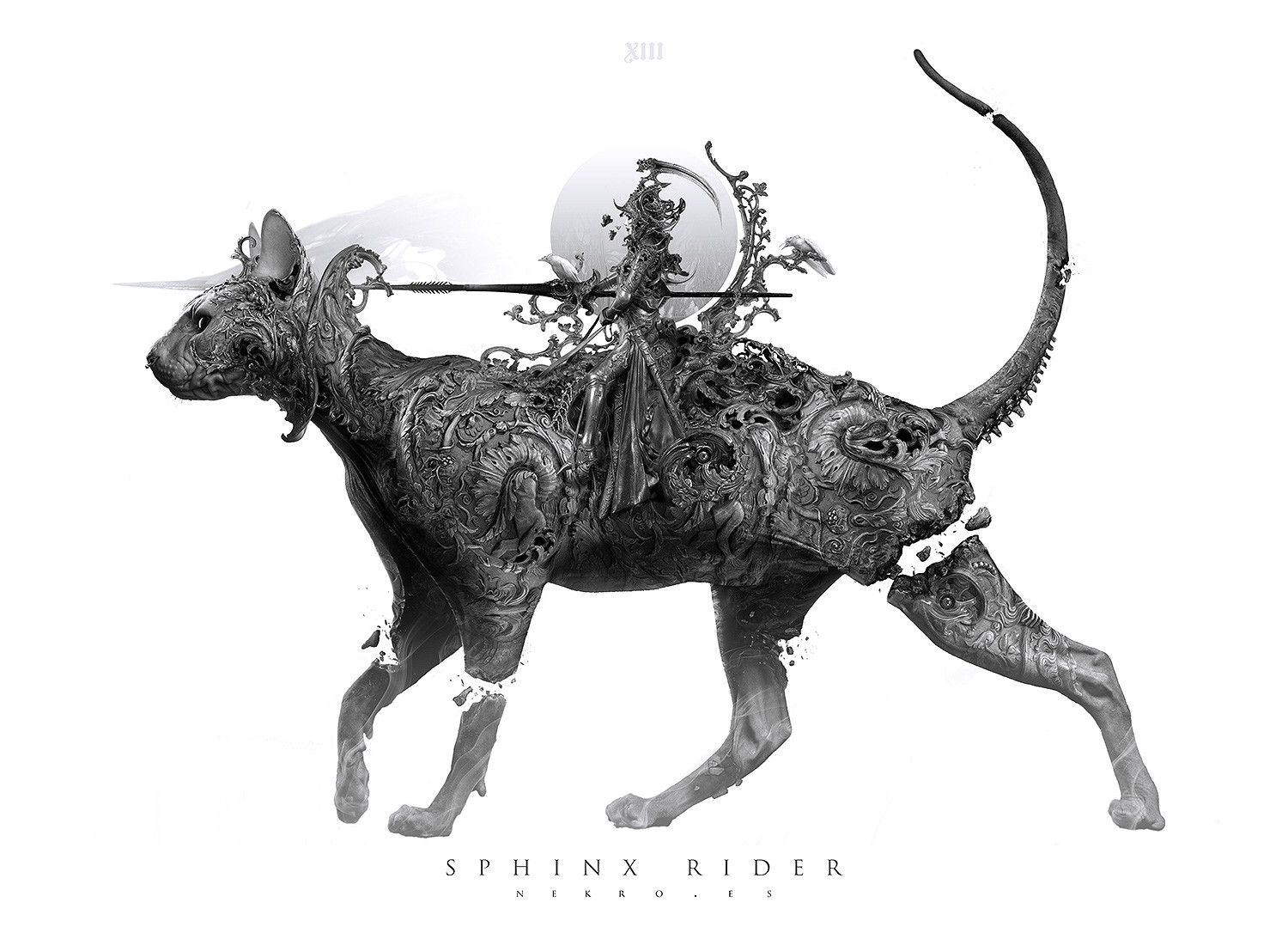 |
| Nekro |
USING THE SPHINX AS A CREATURE
Most Fantasy games have statistics for a Sphinx. I suggest the following feature to be added mechanically.
Riddle Curse/Gift. When the Sphinx meets a creature for the first time, it will ask if it would like to answer a riddle. If the creature fails to answer the riddle before it leaves the presence of the Sphinx, it shall be
CURSED. This curse cannot be lifted save through a powerful exorcism, answering the riddle, or death. But, if the riddle is answered before one leaves the presence of the Sphinx, they earn a gift. Roll 1d6 below to see what this gift is.
- A piece of lapis lazuli, inscribed with a riddles. Acts as a spell scroll of one 6th level COMMANDMENT spell.
- A map that must be translated in order to find the treasure of which it leads to.
- Its services, for a year and a day.
- A curse to be placed on the head of one creature of the riddler's choice.
- The answer to a single question. If the Sphinx does not know the answer, another question may be asked until it does.
- To be sent back in time, reverted to the age of your childhood, and allowed to live your life again but with the knowledge of now.
Treat a party as players as one person, thus giving them only one gift as a whole.
Most Sphinx serve as a roleplaying/social encounter, as well as a puzzle. A Sphinx used in combat should be one that seeks violence as a means to wisdom. This is a wide umbrella. Perhaps the Sphinx is looking to hunt all humans down, as it believes that wisdom is found in a world without them. Or, maybe, the Sphinx seeks to rend and tear armor of all sorts, and will believe itself truly wise after it has damaged every piece of armor to ever be forged. These esoteric reasoning's give the Sphinx an esoteric vibe; it is a strange creature, clearly inhuman, and while not all together horrible, it is something mystifying, horrifying, and awe-inspiring to those that encounter it.
Having the Sphinx wield powerful magic, be surrounded by enchanted items, and dwelling in places of power is key to this. For Sphinx lairs, roll 1d6 or make your own:
- The funeral-palace of a long-dead hero or god-king.
- The throne-room of a demon-queen.
- A place where magic is so thick in the atmosphere that it changes the weather.
- Underneath the boughs of a sacred tree, one where some messianic figure once rested.
- In the center of an ancient battlefield, where great forces were risen and vanquished.
- A place where an afterlife borders the realms of the living.
When the Sphinx is met, it will ask a riddle. If the players decline to answer, roll 1d6 to see how the Sphinx responds.
- A curse upon all who do not answer.
- Unspoken and immediate hyper-violence.
- Offering a gift of some sort.
- Stating that it will kill someone the PCs love dearly if not answered.
- A sudden onslaught of monsters is released from a hidden space.
- A spell, powerful and horrid, is cast upon the PCs.
Roll on treasure tables of your choice, as if you were rolling for a dragon horde. This is the treasure that fills a Sphinx's lair, gifted to it by rulers from a thousand worlds, all of whom have sought the Sphinx's wisdom.
Sentient creatures surround a Sphinx. Dragons will come to trade riddle-answers for treasure, monks will come to study in its shadow, magic-users to learn spells and clerics prayers, adventurers seeking new vistas or long-lost ruins, monarchs and rulers and tyrants wishing to become better rulers, oracles in training to learn the secrets of the future, and, most rarely of all, another Sphinx, coming to trade pslams for just a short time. Thus, an entire dungeon or adventure site manifests around the Sphinx.
 |
| Hekkil |

